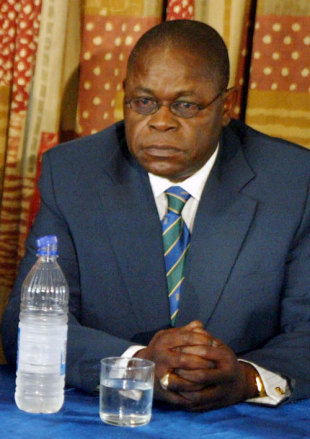The net closes tight
Steven Price reports that time is running out for Zimbabwe Cricket and its head Peter Chingoka
Steven Price in Harare
21-Jun-2008

| ||
Almost a hundred supporters of the opposition have been murdered, with thousands more beaten and driven into hiding. There is every indication that things will get worse in the coming days. Food and fuel are increasingly scarce and the economy is shot to pieces. Inflation is over one million per cent and one US dollar currently buys you 7.4 billion Zimbabwe ones.
Until now, Zimbabwe Cricket has been insulated, able to count on support from a number of senior ICC countries. As recently as April, Peter Chingoka, ZC's chairman, was still in such a strong position that the ICC moved its annual meeting from London in the face of a probable ban on him being allowed entry to the UK.
But things have changed. For a long time, Zimbabwe's friends in the cricket world were willing to overlook many of the country's deficiencies as well as being happy to gloss over some glaring issues in the running of the board, not to mention the desperately poor standard of their cricket both domestically and internationally.
However, things are no longer so straightforward. In the last few days the European Union has taken a step closer to widening sanctions against the Mugabe regime, and it seems increasingly likely that a list of people banned from visiting Europe because of links with the president will be extended.
Given that Chingoka has already been banned by the UK because of his links to Mugabe, his name is almost certain to be on the list. Sources close to the UK government are also believed to have Ozias Bvute, ZC's overtly political managing director, firmly in their sights. It is possible the USA will follow suit.
With the world's attention now firmly on Zimbabwe, there is growing unease with the stance adopted by cricket's administrators. Brushing everything under the carpet, as the ICC did with the independent forensic audit into ZC earlier this year, will not be so easy when the great and the good of the game meet in Dubai next week. The paradox of Chingoka wining and dining with his buddies in five-star hotels while his country goes to the dogs will be one of the less palatable sights on display.
But the ICC, which has looked increasingly irrelevant with the advent of the IPL and Stanford, will risk looking even more out of touch if its executive continues to pretend Zimbabwe's problems are nothing to concern it.
The official line put forward by Zimbabwe's board that sport and politics don't mix looks almost pathetic against the backdrop of what is happening all around it. "Why should we be isolated?" Lovemore Banda, the board's media mouthpiece, said this week. "We don't understand why people would want to mix what is happening in our country politically with sport." Even in a country where official denial is the norm, this was verging on fantasy.
"For now we are focusing on playing more cricket," he added. "We are going to visit countries that come to visit us." That raises a question. Just who is still willing to play against them?
Players themselves, so often left high and dry by their own boards, are taking the lead, adopting a firm line despite what administrators' political expediency dictates. News that South Africa's cricketers are prepared to defy CSA if told to tour Zimbabwe will come as a bitter blow to ZC and the appeasing elements to the south. If things continue to go downhill in Zimbabwe it is inevitable that more players will follow suit, and not just from the usual countries.
The ICC can no longer fudge and hide. It will have to consider what to do with Zimbabwe sooner rather than later.
Fewer countries are willing to play against it, and almost none will tour there. With the stand taken by South Africa's players, Zimbabwe's only friends left are from the Asian block, a reward for Chingoka's puppy-dog support. But India indefinitely postponed a tour there due this month and it is hard to see any too many countries wanting to play a side which brings so much political baggage to the table and who have zero appeal to broadcasters and sponsors.
Then there is Chingoka. Yes, he has important friends, but he is becoming a liability as Zimbabwe is increasingly seen as a public-relations sore. He will cling to power as long as he can, but behind the scenes there is a feeling that Zimbabwe might be manageable but for him. He will have to work harder than ever in Dubai to convince board heads that he and his country are worth all the trouble they cause.
The end of Zimbabwe's spell at cricket's top table is drawing closer. For a decade they punched above their weight. For the last five years they have become less credible and more problematical. The irony is that while the ICC has clung to the "sport and politics don't mix" defence, it will be politics and not sport that finishes Zimbabwe off.
Steven Price is a freelance journalist based in Harare